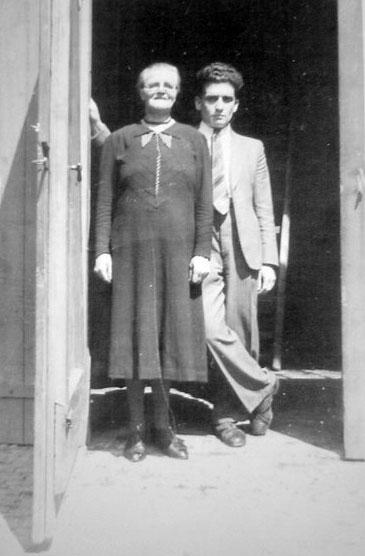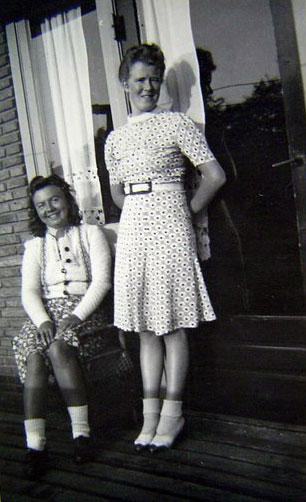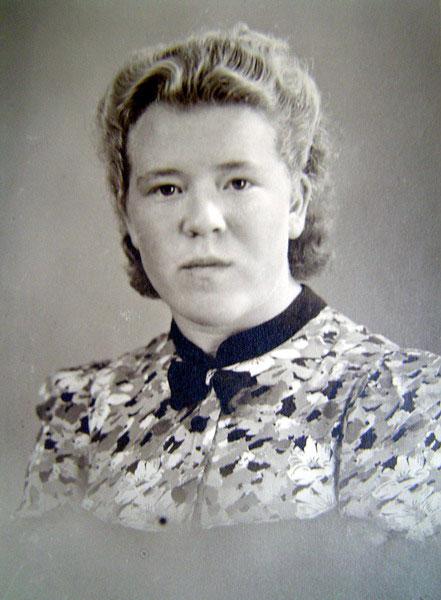





Sunday to Thursday: 09:00-17:00
Fridays and Holiday eves: 09:00-14:00
Yad Vashem is closed on Saturdays and all Jewish Holidays.
Entrance to the Holocaust History Museum is not permitted for children under the age of 10. Babies in strollers or carriers will not be permitted to enter.






When Hilde Duizer’s father Frans died in 1940, 17-year-old Hilde had to leave school, and return home to help her mother Gijsbertje with the family farm in Asperen (prov. Gelderland).
At the end of 1941 the situation of the Jews deteriorated and the anti-Jewish policy intensified; special measures were enacted againt Jewish refugees. An acquaintance of the Duizers asked them if they would take in a Jewish refugee from Germany. After a family consultation, they agreed to let Daniel Hess, in his twenties, stay at the farm. Hess helped out with the chores, but made sure to stay out of sight. In summer 1942 the deportations of the Jews to the camps in the east began. Daniel Hess who missed his girlfriend, decided, against the advice of the Duizers, to visit her in Amsterdam. He was caught and deported.
The capture of Hess and the possibility that he may have been interrogated and divulged where he had been hiding didn’t deter the Duizers and in 1943 they decided to hide Joseph (Joopke) van Straten, then aged 22, on their farm. The van Straten family had a butcher store in Rumpt, one of the neighboring villages, and before the war used to buy cattle from the Duizers. Thus when Joseph Van Straten managed to escape after being arrested, he turned to the Duizers for help. Realizing that he was in terrible danger, mother and daughter accepted him without hesitation. They did it despite the fact that there family was already in conflict with the occupying German authorities - one of the Duizer sons, a policeman, had refused to go for training in Schalkhaar, a police training center established on Nazi principles.
Joseph Van Straten slept in the attic. During the day he stayed inside and out of sight, but after dark, he would go out and help with whatever he could. One day in 1944, the Germans surrounded the entire village, looking for Jews as well as illegal radios and bicycles. They forced themselves into the Duizer home, and searched every room. Joseph was hiding in a haystack. As the Germans approached his hiding place, Hilde started to flirt with the soldiers in order to divert their attention. This saved him from discovery and death.
Jophef Van Straten stayed on the farm until the liberation of the area in April 1945. In the course of his hiding with the Duizers Joseph and Hilde fell in love. After the war they got married, Hilde converted to Judaism and with her husband immigrated to Israel . Despite the difficulties, she embraced her new culture - she loved the Bible and Jewish prayers, learned to cook Dutch-Jewish food, and invested great efforts in learning Hebrew. Having been brought up in the Netherlands, she continued to ride her bicycle even in her old age.
On June 13, 2004, Yad Vashem recognized Gijsbertje Duizer-Verhoef and Hilde van Straten-Duizer, as Righteous Among the Nations. The awards were presented to Hilde and her sister Cor in a moving ceremony in the Garden of the Righteous on 31 March 2005.
In March 2011 Hilde van Straten passed away and was buried in the cemetery of Kibbut Beerot Yitzhak in the country that had become her own, where her three children had grown up, and where her 13 grandchildren and 19 great-grandchildren were born.

Thank you for registering to receive information from Yad Vashem.
You will receive periodic updates regarding recent events, publications and new initiatives.

"The work of Yad Vashem is critical and necessary to remind the world of the consequences of hate"
Paul Daly
#GivingTuesday
Donate to Educate Against Hate


Worldwide antisemitism is on the rise.
At Yad Vashem, we strive to make the world a better place by combating antisemitism through teacher training, international lectures and workshops and online courses.
We need you to partner with us in this vital mission to #EducateAgainstHate
The good news:
The Yad Vashem website had recently undergone a major upgrade!
The less good news:
The page you are looking for has apparently been moved.
We are therefore redirecting you to what we hope will be a useful landing page.
For any questions/clarifications/problems, please contact: webmaster@yadvashem.org.il
Press the X button to continue



